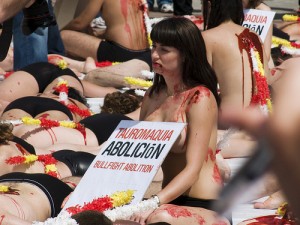Rich in tradition and explicit in diversity, Spain is a country constantly suffering an identity crisis. Liberalism and democracy were born along with nationalism and separatism after Francisco Franco’s death in 1975.

While Spain’s official language is Spanish, a handful of regional languages are spoken across the country. In the northeastern region of Catalonia, people speak Catalan. Citizens from the southern region of Andalusia speak Spanish. A citizen from Seville might not be able to read Avui (a Barcelona-based newspaper printed in Catalan), but when the Catalan government passed a law last summer to close the only remaining bullring in Barcelona in 2012, the bullfighting community in Seville claims to understand why.
“It’s a controversy that if you’ve read the newspaper you’ll see has much more to do with today’s politics in Spain – a controversy that is connected to nationalism, with Catalonia’s separatism,” says Álvaro R. del Moral, a bullfighting journalist for the Correo de Andalucía newspaper. “(They) want to create some differences between Spain as a nation and Catalonia.”
Politicians had the final say, deciding in favor of the ban by a count of 68 votes to 55, including nine members who abstained. But a petition presented to the government signed by 180,000 Catalans prompted political debate. Those who signed did so because they view bullfighting as a deliberate violation of animal rights. Spaniards involved and enamored with bullfighting think the contrary.
“(Animal rights activists) don’t realize that the best way to protect the animals is to protect nature, and bullfighting festivities are the most natural in the world,” Del Moral says.
Supporters say bullfighters love the bull, and the progression of the fight, eventually ending in the bull’s death, is morally correct. French philosopher and bullfighting advocate Francis Wolff spoke at the Seville Fair last April, explaining his theory behind the art of bullfighting: “The only one who can kill the respected animal is one who risks his own life. It’s said, one receives the right to kill the bull with the act of putting one’s own life at stake, because to fight without danger is synonymous with triumph without glory.”
Bullfighting activists back Wolff’s philosophy and point their fingers at the hundreds of animals used for food production that die daily without a fight, emphasizing that bullfighting presents a “fair chance” for the animal’s survival. A chance that always ends the same way, pre-determined by nature – something bullfighting supporters say animal rights groups fail to understand.
“The ones that don’t know bullfighting and bullfights think that it is something cruel because from first sight, the only thing that you see is the bull’s blood,” says Paco Lama, a 17-year-old amateur bullfighter. “But when they are taught what goes on in bullfights, they are taught what we do, how we live, they love it because morally it is a festival that is open to argument, but artistically I think that it is something unbeatable.”
An art or not, the Catalan government defeated bullfighting and the same possibility exists throughout Spain’s northern provinces, including Galicia and Asturias. But in Seville, Spain’s largest southern city, protests against bullfighting are much less common. It’s a city that breathes traditionalism, and bullfighting follows suit.
“The relationship between the bull and the Spanish terrain is as old as history itself,” Del Moral says. “It belongs to the soul of this country.”
Could part of Spain’s soul be dying? Its younger generation will ultimately hold the answer to that question.
This is the first article in a three-part series on bullfighting in Spain, published by Iberosphere each Monday.
Leave a Reply
You must be logged in to post a comment.